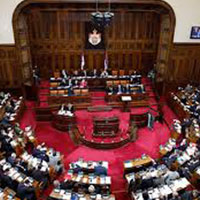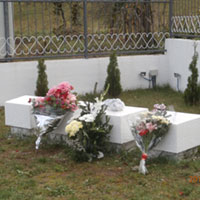Serbian authorities urged to abandon revision of history and denial of court-established facts

 The Chief Prosecutor of the International Criminal Tribunal for the former Yugoslavia (ICTY), Serge Brammertz, in his regular six-month address to the UN Security Council on 7 June 2017, presented a report in which he warned of a growing trend of denial and revisionism of court- established facts in Serbia and the entire region, as well as of the burning issue of the slowdown in the process of war crimes trials before Serbian courts, and the difficulties of regional cooperation between specialized prosecution offices. At the same session of the UN Security Council, the Serbian representative Čedomir Backović rejected any words of criticism and opposed Brammertz’s substantive objections by presenting the supposed statistical successes of the Serbian government that he represents. The signatories to this appeal demand that the Serbian authorities consider carefully the objections addressed to Serbia during the UN Security Council session, and deal with problems that have in recent years resulted in the growth of nationalism in society and a drastic deterioration in relations with the countries of the region.
The Chief Prosecutor of the International Criminal Tribunal for the former Yugoslavia (ICTY), Serge Brammertz, in his regular six-month address to the UN Security Council on 7 June 2017, presented a report in which he warned of a growing trend of denial and revisionism of court- established facts in Serbia and the entire region, as well as of the burning issue of the slowdown in the process of war crimes trials before Serbian courts, and the difficulties of regional cooperation between specialized prosecution offices. At the same session of the UN Security Council, the Serbian representative Čedomir Backović rejected any words of criticism and opposed Brammertz’s substantive objections by presenting the supposed statistical successes of the Serbian government that he represents. The signatories to this appeal demand that the Serbian authorities consider carefully the objections addressed to Serbia during the UN Security Council session, and deal with problems that have in recent years resulted in the growth of nationalism in society and a drastic deterioration in relations with the countries of the region.







 On Monday, May 15th 2017, the National Assembly of the Republic of Serbia
On Monday, May 15th 2017, the National Assembly of the Republic of Serbia 
 The Serbian Constitutional Court has adopted a
The Serbian Constitutional Court has adopted a 
 In March 7th and 8th, 2017, the Serbian delegation presented the Third Periodic Report on the Implementation of the International Covenant on Civil and Political Rights before the UN Committee for Human Rights in Geneva. The report contains data on the prosecution of war crimes in Serbia. During the
In March 7th and 8th, 2017, the Serbian delegation presented the Third Periodic Report on the Implementation of the International Covenant on Civil and Political Rights before the UN Committee for Human Rights in Geneva. The report contains data on the prosecution of war crimes in Serbia. During the 

 On February 18th, 2017, it was 24 years since members of the then Yugoslav Army (VJ) attacked and destroyed by shelling the village of Kukurovići in the municipality of Priboj (Serbia), in which the majority of the population were Bosniaks, and killed three villagers. The Humanitarian Law Center (HLC) and the Sandžak Committee for the Protection of Human Rights and Freedoms (Sandžak Committee) use this opportunity to remind the public that even after 24 years, the state of Serbia does not accept responsibility for the crime and refuses to punish the perpetrators and compensate the victims’ families and those residents of Kukurovići whose property was destroyed.
On February 18th, 2017, it was 24 years since members of the then Yugoslav Army (VJ) attacked and destroyed by shelling the village of Kukurovići in the municipality of Priboj (Serbia), in which the majority of the population were Bosniaks, and killed three villagers. The Humanitarian Law Center (HLC) and the Sandžak Committee for the Protection of Human Rights and Freedoms (Sandžak Committee) use this opportunity to remind the public that even after 24 years, the state of Serbia does not accept responsibility for the crime and refuses to punish the perpetrators and compensate the victims’ families and those residents of Kukurovići whose property was destroyed. 


 On January 31st, 2017, the Humanitarian Law Center (HLC) filed a criminal complaint with the Office of the War Crimes Prosecutor for a crime against prisoners of war committed against members of the Army of Bosnia and Herzegovina (BiH) in July 1993, at Golo Brdo on Mount Igman in Bosnia.
On January 31st, 2017, the Humanitarian Law Center (HLC) filed a criminal complaint with the Office of the War Crimes Prosecutor for a crime against prisoners of war committed against members of the Army of Bosnia and Herzegovina (BiH) in July 1993, at Golo Brdo on Mount Igman in Bosnia.
 On January 19th, 2017, the Steering Committee of the Bar Association of Belgrade (BAB)
On January 19th, 2017, the Steering Committee of the Bar Association of Belgrade (BAB) 
 At a public meeting of the Serbian Progressive Party (SNS), held in Beška near Inđija on 17 January 2017, members of the above-mentioned party physically attacked activists of the Youth Initiative for Human Rights in Serbia (YIHR), injuring several of them on that occasion. The attack took place when the YIHR activists unfurled a banner which read, “War criminals should become silent so that the victims can be spoken about!”, thereby stopping the speech of the
At a public meeting of the Serbian Progressive Party (SNS), held in Beška near Inđija on 17 January 2017, members of the above-mentioned party physically attacked activists of the Youth Initiative for Human Rights in Serbia (YIHR), injuring several of them on that occasion. The attack took place when the YIHR activists unfurled a banner which read, “War criminals should become silent so that the victims can be spoken about!”, thereby stopping the speech of the